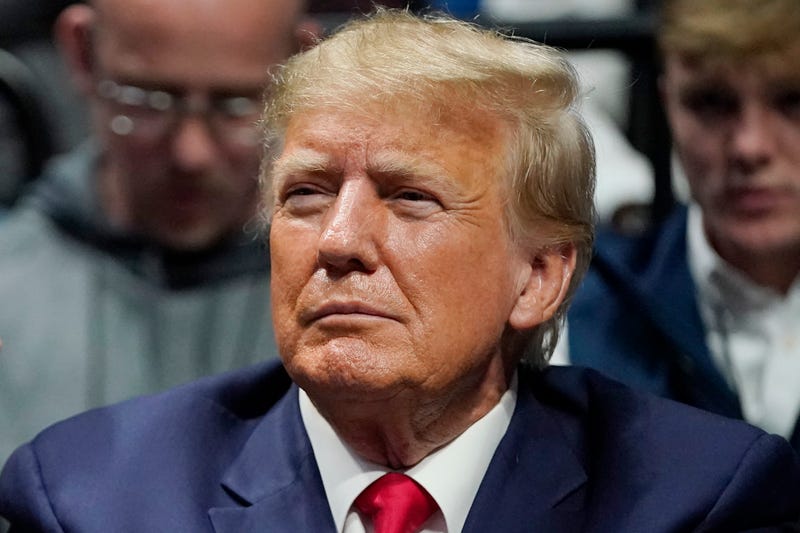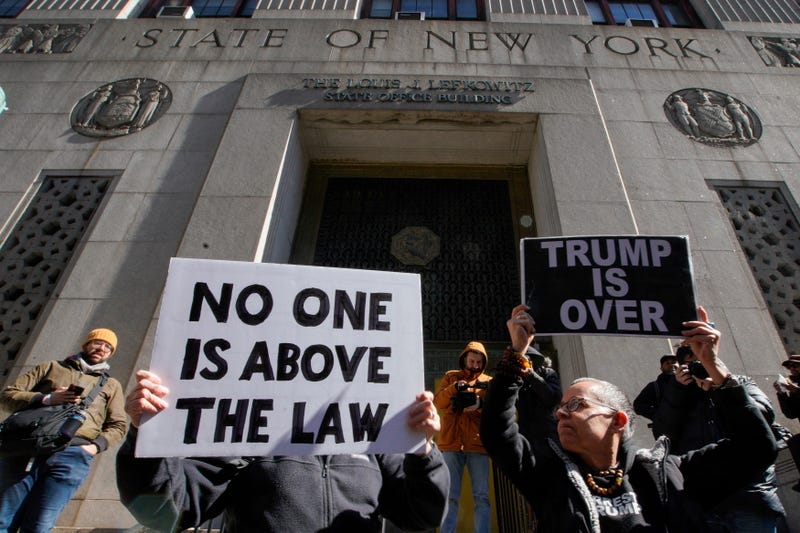
A Manhattan grand jury has voted to indict Donald Trump on charges involving payments made during the 2016 presidential campaign to silence claims of an extramarital sexual encounter, his lawyers said Thursday, producing the first criminal case against a former U.S. president and a jolt to Trump’s bid to retake the White House.
Trump, who has denied any wrongdoing and has repeatedly attacked the investigation, called the indictment “political persecution” and predicted it would damage Democrats in 2024.
The indictment is an extraordinary development after years of investigations into his business, political and personal dealings.
“We've never had a president of the United States, indicted, convicted and served jail time," said Drexel political science professor Dr. Bill Rosenberg, who has been following the case. "We have illustrations of this in other countries around the world, where our prime ministers or presidents are arrested — often tied to crimes of corruption — and they have served jail time, but it's not the tradition in the United States.”
It is likely to galvanize critics who say Trump lied and cheated his way to the top and embolden supporters who feel the Republican is being unfairly targeted by a Democratic prosecutor.
“This is going to be basically a very difficult situation for the country, because people are going to come out and are going to be very much in disagreement and may lead to more Jan. 6-type of events,” Rosenberg said. “There's going to be deep concern about how to maintain order and decorum both at the courthouse and in the surrounding areas.”
While Trump has been involved in a litany of legal issues, Rosenberg explains this particular case isn’t like the others.
“It's a little bit different, in the sense that there are specific charges of a criminal nature in which he has violated rules associated with campaigning,” Rosenberg said. “He's not supposed to be able to provide hush money, essentially, to someone to have them stay quiet prior to an election, which is, in effect, what he's been charged with, with stormy Daniels in the 2016 presidential race.”
Rosenberg says he doesn't expect Trump to serve jail time. He does, however, expect more charges to be announced ahead of the 2024 presidential campaign.
“This first indictment may open the door for a number of other indictments that are going to come down the road rather quickly. And I think that's because we're starting to get more and more into the period where the 2024 presidential race is starting to heat up,” he said.
“So I think what we're facing here is one in which prosecutors are probably going to feel compelled if they're going to do something they need to do it in the near term.”
In a statement, his lawyers, Susan Necheles and Joseph Tacopina, said: “He did not commit any crime. We will vigorously fight this political prosecution in court.”
The district attorney's investigation centered on money paid to porn actor Stormy Daniels and former Playboy model Karen McDougal, whom he feared would go public with claims that they had extramarital sexual encounters with him.
Trump was expected to surrender to authorities next week, though the details were still being worked out, according to a person familiar with the matter who was not authorized to discuss a matter that remained under seal.
In bringing the charges, the Manhattan district attorney, Alvin Bragg, is embracing an unusual case that had been investigated by two previous sets of prosecutors, both of which declined to take the politically explosive step of seeking Trump’s indictment.
In the weeks leading up to the indictment, Trump railed about the investigation on social media and urged supporters to protest on his behalf, prompting tighter security around the Manhattan criminal courthouse.

Trump faces other potential legal perils as he seeks to reassert control of the Republican Party and stave off a slew of one-time allies who are seeking or are likely to oppose him for the presidential nomination.
The district attorney in Atlanta has for two years been investigating efforts by Trump and his allies to meddle in Georgia’s 2020 vote count. And a U.S. Justice Department special counsel is investigating Trump’s storage of classified documents at his Mar-a-Lago home in Florida and his efforts to reverse his election loss.
The fate of the hush-money investigation seemed uncertain until word got out in early March that Bragg had invited Trump to testify before a grand jury, a signal that prosecutors were close to bringing charges.
Trump’s attorneys declined the invitation, but a lawyer closely allied with the former president briefly testified in an effort to undercut the credibility of Trump’s former lawyer and fixer Michael Cohen.
Late in the 2016 presidential campaign, Cohen paid Daniels $130,000 to keep her silent about what she says was a sexual encounter with Trump a decade earlier after they met at a celebrity golf tournament.
Cohen was then reimbursed by Trump’s company, the Trump Organization, which also rewarded the lawyer with bonuses and extra payments logged internally as legal expenses. Over several months, Cohen said, the company paid him $420,000.
Earlier in 2016, Cohen had also arranged for the publisher of the supermarket tabloid the National Enquirer to pay Playboy model Karen McDougal $150,000 to squelch her story of a Trump affair in a journalistically dubious practice known as “catch-and-kill.”
The payments to the women were intended to buy secrecy, but they backfired almost immediately as details of the arrangements leaked to the news media.
Federal prosecutors in New York ultimately charged Cohen in 2018 with violating federal campaign finance laws, arguing that the payments amounted to impermissible help to Trump’s presidential campaign. Cohen pleaded guilty to those charges and unrelated tax evasion counts and served time in federal prison.
Trump was implicated in court filings as having knowledge of the arrangements, but U.S. prosecutors at the time balked at bringing charges against him. The Justice Department has a longtime policy that it is likely unconstitutional to prosecute a sitting president in federal court.
Bragg’s predecessor as district attorney, Cyrus Vance Jr., then took up the investigation in 2019. While that probe initially focused on the hush money payments, Vance’s prosecutors moved on to other matters, including an examination of Trump’s business dealings and tax strategies.
Vance ultimately charged the Trump Organization and its chief financial officer with tax fraud related to fringe benefits paid to some of the company’s top executives.
The hush money matter became known around the D.A.’s office as the “zombie case,” with prosecutors revisiting it periodically but never opting to bring charges.
Bragg saw it differently. After the Trump Organization was convicted on the tax fraud charges in December, he brought fresh eyes to the well-worn case, hiring longtime white-collar prosecutor Matthew Colangelo to oversee the probe and convening a new grand jury.
Cohen became a key witness, meeting with prosecutors nearly two-dozen times, turning over emails, recordings and other evidence and testifying before the grand jury.
Trump has long decried the Manhattan investigation as “the greatest witch hunt in history.” He has also lashed out at Bragg, calling the prosecutor, who is Black, racist against white people.
The criminal charges in New York are the latest salvo in a profound schism between Trump and his hometown — a reckoning for a one-time favorite son who grew rich and famous building skyscrapers, hobnobbing with celebrities and gracing the pages of the city’s gossip press.
Trump, who famously riffed in 2016 that he “could stand in the middle of Fifth Avenue and shoot somebody” and “wouldn’t lose voters,” now faces a threat to his liberty or at least his reputation in a borough where more than 75% of voters — many of them potential jurors — went against him in the last election.



